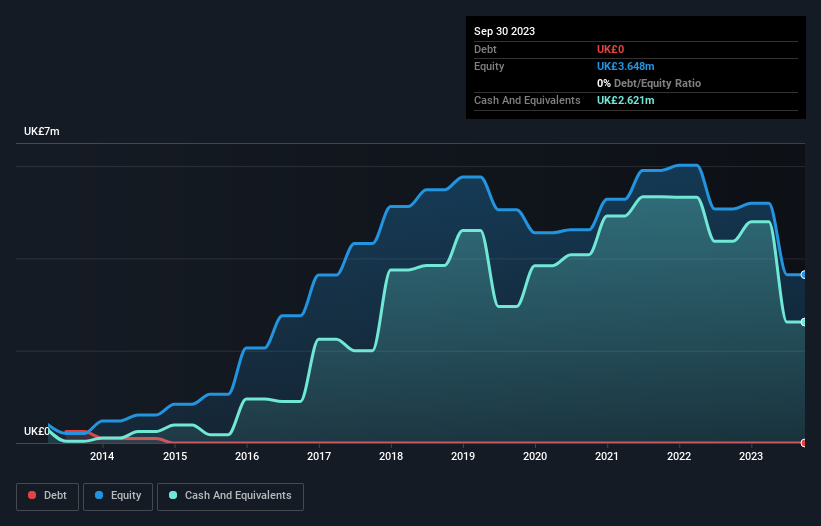- United Kingdom
- /
- IT
- /
- LSE:TRD
We're Interested To See How Triad Group (LON:TRD) Uses Its Cash Hoard To Grow
We can readily understand why investors are attracted to unprofitable companies. For example, biotech and mining exploration companies often lose money for years before finding success with a new treatment or mineral discovery. But the harsh reality is that very many loss making companies burn through all their cash and go bankrupt.
Given this risk, we thought we'd take a look at whether Triad Group (LON:TRD) shareholders should be worried about its cash burn. In this report, we will consider the company's annual negative free cash flow, henceforth referring to it as the 'cash burn'. The first step is to compare its cash burn with its cash reserves, to give us its 'cash runway'.
View our latest analysis for Triad Group
Does Triad Group Have A Long Cash Runway?
A company's cash runway is calculated by dividing its cash hoard by its cash burn. When Triad Group last reported its September 2023 balance sheet in December 2023, it had zero debt and cash worth UK£2.6m. In the last year, its cash burn was UK£544k. So it had a cash runway of about 4.8 years from September 2023. There's no doubt that this is a reassuringly long runway. Depicted below, you can see how its cash holdings have changed over time.

Is Triad Group's Revenue Growing?
Given that Triad Group actually had positive free cash flow last year, before burning cash this year, we'll focus on its operating revenue to get a measure of the business trajectory. Regrettably, the company's operating revenue moved in the wrong direction over the last twelve months, declining by 9.2%. In reality, this article only makes a short study of the company's growth data. You can take a look at how Triad Group has developed its business over time by checking this visualization of its revenue and earnings history.
How Hard Would It Be For Triad Group To Raise More Cash For Growth?
Since its revenue growth is moving in the wrong direction, Triad Group shareholders may wish to think ahead to when the company may need to raise more cash. Issuing new shares, or taking on debt, are the most common ways for a listed company to raise more money for its business. One of the main advantages held by publicly listed companies is that they can sell shares to investors to raise cash and fund growth. By comparing a company's annual cash burn to its total market capitalisation, we can estimate roughly how many shares it would have to issue in order to run the company for another year (at the same burn rate).
Triad Group's cash burn of UK£544k is about 1.6% of its UK£34m market capitalisation. That means it could easily issue a few shares to fund more growth, and might well be in a position to borrow cheaply.
Is Triad Group's Cash Burn A Worry?
It may already be apparent to you that we're relatively comfortable with the way Triad Group is burning through its cash. For example, we think its cash runway suggests that the company is on a good path. While its falling revenue wasn't great, the other factors mentioned in this article more than make up for weakness on that measure. After taking into account the various metrics mentioned in this report, we're pretty comfortable with how the company is spending its cash, as it seems on track to meet its needs over the medium term. On another note, Triad Group has 3 warning signs (and 2 which can't be ignored) we think you should know about.
Of course, you might find a fantastic investment by looking elsewhere. So take a peek at this free list of interesting companies, and this list of stocks growth stocks (according to analyst forecasts)
Valuation is complex, but we're here to simplify it.
Discover if Triad Group might be undervalued or overvalued with our detailed analysis, featuring fair value estimates, potential risks, dividends, insider trades, and its financial condition.
Access Free AnalysisHave feedback on this article? Concerned about the content? Get in touch with us directly. Alternatively, email editorial-team (at) simplywallst.com.
This article by Simply Wall St is general in nature. We provide commentary based on historical data and analyst forecasts only using an unbiased methodology and our articles are not intended to be financial advice. It does not constitute a recommendation to buy or sell any stock, and does not take account of your objectives, or your financial situation. We aim to bring you long-term focused analysis driven by fundamental data. Note that our analysis may not factor in the latest price-sensitive company announcements or qualitative material. Simply Wall St has no position in any stocks mentioned.
About LSE:TRD
Triad Group
Provides information technology consultancy services to the public, private, and not-for-profit sectors in the United Kingdom.
Outstanding track record with flawless balance sheet.
Market Insights
Community Narratives


Recently Updated Narratives

Astor Enerji will surge with a fair value of $140.43 in the next 3 years

Proximus: The State-Backed Backup Plan with 7% Gross Yield and 15% Currency Upside.


A case for for IMPACT Silver Corp (TSXV:IPT) to reach USD $4.52 (CAD $6.16) in 2026 (23 bagger in 1 year) and USD $5.76 (CAD $7.89) by 2030
Popular Narratives


MicroVision will explode future revenue by 380.37% with a vision towards success


The company that turned a verb into a global necessity and basically runs the modern internet, digital ads, smartphones, maps, and AI.



